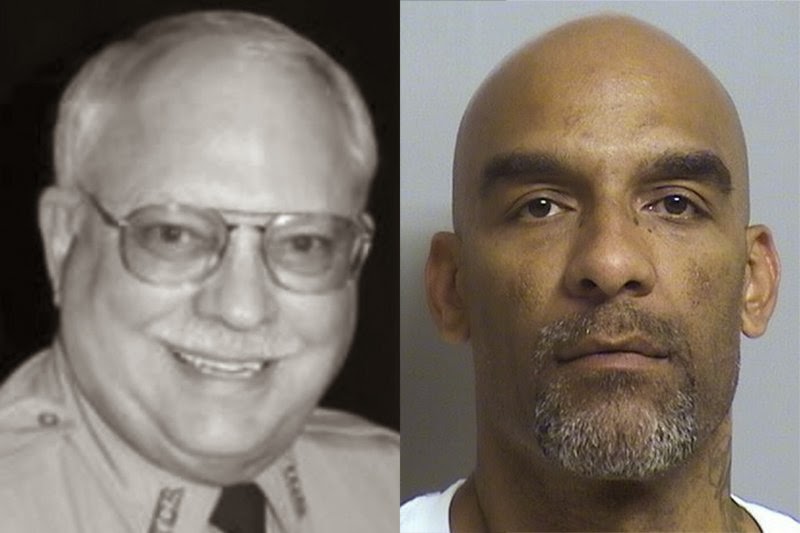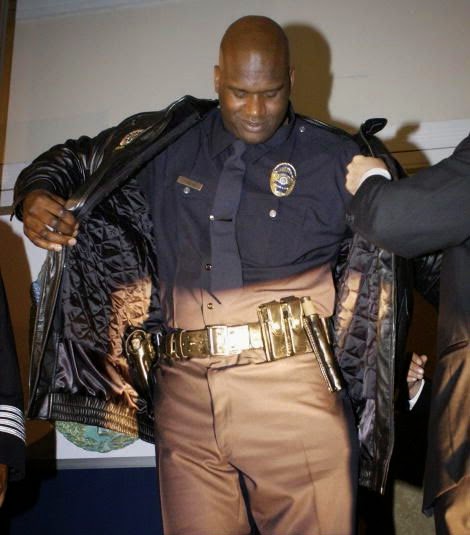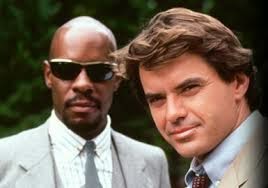Note: This essay has been updated to reflect the criminal charge against Robert Bates.
Some wealthy men of a certain age pay an extravagant fee to attend fantasy camps where they can pretend to be Major League Baseball players, or engage in brief jam sessions with patient and well-compensated classic rock performers. Others take part in “canned hunts” in which the prey are penned in and sometimes specially bred to be helpless.
Some wealthy men of a certain age pay an extravagant fee to attend fantasy camps where they can pretend to be Major League Baseball players, or engage in brief jam sessions with patient and well-compensated classic rock performers. Others take part in “canned hunts” in which the prey are penned in and sometimes specially bred to be helpless.
Tulsa
insurance executive Robert Bates bought the full Fantasy Cop package – but it
was Eric Harris who paid the premium when Bates fatally shot him following an
undercover “sting” operation on April 9. He now faces a second-degree manslaughter charge.
Since 2008, Bates, who spent a single inglorious year as a
police officer more than five decades ago, has
been enrolled as a “reserve deputy” with the Tulsa County Sheriff’s Office.
During the altercation on April 9, Bates apparently mistook his handgun for a
Taser.
Unlike the “real” peace officers on the scene, Bates’
first impulse was to apologize as his victim’s life ebbed away. That
apology was probably directed not at the victim, but at the reserve deputy’s
steroid-enhanced and tattooed comrades – one of whom was kneeling on the back
of the victim’s head. They probably didn’t notice, given that they were too
busy taunting the dying man.
“You f***g ran! … F**k your breath!” snarled one of the privileged
simians in the Tulsa Violent Crimes Task Force. He might not have been aware
that Harris had endured a fatal gunshot wound. In any case, he almost certainly
didn’t care. It is entirely illegal for police to kill fleeing, unarmed suspect
because he ran. It is also quite commonplace. This helps explain why it was that
in the month of March –
by one calculation – American police shot a greater number of suspects than
British police did during the entire 20th Century.
If one of the full-time deputies had fired the fatal shot, the
assailant would enjoy “qualified immunity” relieving him of civil liability
and protecting him from criminal prosecution. Apparently, “qualified
immunity” doesn't come with the Fantasy Cop Package that Bates purchased through his
donations. Major Shannon Clark of the TCSO told the Tulsa World that “There are
lots of wealthy people in the reserve program. Many of them make donations of
items. That’s not unusual at all.”
In the seven years since he became a reserve deputy, Bates
has donated firearms, stun guns, and several vehicles to the department.
Without disclosing details of his training and qualifications, the TCSO lists
Bates as an “advanced reserve,” in which position he was entitled to “do
anything a full-time deputy can do” – except, apparently, the ability to
absolve himself of legal accountability by invoking “qualified immunity.”
The selling point for the TCSO’s donor program is status, not service. This reflects the fact that, as I’ve noted before, law
enforcement defines its role in terms of what police can do to people, rather than what they are required to do on their behalf.
This sense of being elevated above the common
herd offers a compelling appeal to the libido dominandi, and that allure
explains why wealthy people and celebrities – such as Shaquille
O’Neal, Steven
Segal, and Ted
Nugent – become dilettante cops. Both O’Neal and Segal
participated in botched SWAT raids, which apparently is one of the perks of a
celebrity buy-in.
Furthermore, in some jurisdictions that exalted status is
literally given away.
“Many assume police officers are rigorously trained before
being allowed to patrol the streets,” observes
the Shreveport Times. “But drive through rural Louisiana and it’s possible
to be stopped by a law enforcement officer who’s never experienced a day of
police academy and instruction on use of force, stressful scenarios and
physical fitness that comes with it. Sometimes, an eight-hour firearms training
and on-the-job guidance is all an officer gets before starting work as a
salaried, gun-toting, arrest-making officer.”
Louisiana’s state law allows municipal political cliques (sometimes
called “city governments”) to hire and deploy armed collection and abduction
specialists (otherwise known as “full-time
sworn officers”) and keep them on the
payroll for up to a year before they become certified police officers. Some
departments “simply violate the law, sometimes failing to send full-time
officers to the academy,” according to Kenny Saunders, who teaches at a
state-certified academy.
Motorists in rural Louisiana run an appreciable risk of
being detained, harassed, or otherwise abused by a costumed stranger whose
official status as a police officer is akin to that of Eric Cartman.
Let it not be thought, however, that this is a problem that
can be solved by making certification standards more rigorous. A
state-certified purveyor of aggressive force is just as dangerous to innocent
people as one whose credentials aren’t in order, assuming that both can take
refuge within the spurious doctrine of “qualified immunity.”
There are anywhere
from three to five times as many private security officers – such as armed guards,
private investigators, and armored car drivers -- in the United States as “sworn
law enforcement officers.” A private peace officer who kills or injures an
innocent person is not protected by “qualified immunity.”
While a police
officer has no enforceable duty to protect an innocent person from harm, a
private security operative who fails to carry out his contractual duty of care
might be liable to a civil action, and will certainly be punished in the
marketplace.
In Idaho, it is possible to become a private investigator
simply by advertising one’s services. If clients are willing to pay you to ask
questions, or an established detective agency is interested hiring you to
conduct surveillance or file public records requests, you can call yourself a private investigator –
with the understanding that you are fully liable if you are charged with a
crime or hit with a lawsuit.
At present, only six cities in Idaho (interestingly, Boise
is not one of them) impose a licensing requirement for private investigators. Although
there is no state licensing requirement, the Private Investigators Association
of Idaho (PIAI) has introduced a “Certified Private Investigator” program
intended to establish professional standards in the industry.
The first requirement to become a CPI would be to carry, and
maintain, at least $500,000 in errors and omissions or general liability insurance.
“Anybody looking to hire a reputable and reliable
investigator should require him to have at least a half-million in liability
insurance,” PIAI President Dan Landis told me in a telephone interview. “If
someone gets hurt through an act or oversight, or gets arrested for the wrong
reason, the investigator needs to be covered.”
Every day, police injure and kill people through bad acts or
culpable omissions, and arrest people without legitimate cause – and those
responsible generally suffer no personal consequences because of their supposed
authority. Police are not required to carry personal liability insurance to
cover such contingencies. On those rare occasions when fault is found, the
financial consequences are socialized, which means that they are ultimately absorbed
by the tax victims within a given political jurisdiction.
Private investigators, like other private peace officers,
are not afforded that corrupt luxury. This is why the
PIAI’s minimum standards for certification are more demanding that those
that must be met for police applicants in many municipalities.
Applicants cannot have a criminal record of any kind. They
must be bonded and pass a deep and extensive background check. Although there is no private investigators’
academy, applicants must have “a minimum of 500 hours (verifiable) experience
in the field of `private investigations.’”
Significantly, “Law enforcement, government or military experience
does not qualify as `private investigations.’”
“Being ex-law enforcement doesn’t mean a thing,” Landis contends,
because a police officer, in the final analysis, is merely an individual with “a
gun, a badge, and a suit.”
The totems of government “authority” protect those who carry
them from the legal consequences of using aggressive force. They do not confer
the acumen, character, or persistence necessary to uncover facts and build a
case.
Even without formal, albeit non-governmental, certification,
private investigators – unlike government-employed enforcers -- cannot succeed
without producing results.
When a burglary is committed, the victim doesn’t have the
option of choosing the most competent police agency (assuming one exists) to
investigate the crime; he or she must be content with the “service” offered by
the department claiming a local franchise within the government’s coercion cartel.
Because it operates as part of a monopoly, the police department can’t go out
of business, and it treats customer dissatisfaction as an “officer safety”
issue rather than a reason to improve its job performance.
This helps explain why, in a country where the government
confiscates billions of dollars each year in the name of “public safety,”
citizens probably spend at least that much more to pay for protection of
persons and property, or to investigate crimes against them – services that are
supposedly provided through the state’s security monopoly.
If Robert Bates had been interested in protecting persons
and property, he would have invested in a private security firm. He preferred the power, prestige, and privilege
that come with being part of the state’s coercive caste. Under the abysmal
standards governing that profession, Bates may have considered himself immune to the consequences of committing negligent homicide.
After all, every law
enforcement officer is impersonating a peace
officer – so why should Bates be singled out for exemplary punishment?
If you can, please donate to help keep Pro Libertate on-line. Thank you, and God bless!
Dum spiro, pugno!





5 comments:
Another excellent blog post over at UATK:http://joelsgulch.com/the-only-answer-to-the-police-problem-is-to-make-them-more-than-human/#more-13730
The money quote:
You know the most important thing about a genuine elite? Reputation. Those people (Think Navy SEALS, if you must. Or a really good NFL team) truly give a damn about their reputations. They earned them through hard work that would simply be impossible for regular people. They deserve them, they are jealous of them, and they will by god be the very first to throw anybody who sullies them out on his no-longer-privileged ass. As someone posing as a really smart person once said,
If they have immunity - as you repeatedly claim - then why is the police officer in North Charleston facing murder charges?
The case in North Charleston is a very welcome anomaly, and the prosecution of Mr. Slager is entirely the result of a brave young man who acted as a peace officer by collecting evidence of a crime that would otherwise have gone unpunished.
I neither invented the concept of "qualified immunity," nor am I the one who most frequently invokes it. In this case described above, the officers who refused to render aid to the victim should face prosecution for negligent homicide as well; their role will most likely be excused on account of their status as "sworn law enforcement officers" and the magical immunity that attaches thereto.
In fact, Mr. Bates' attorney expressed surprise that the shooting wouldn't be treated as an "excusable homicide" precisely because of his role as a pay-for-play LEO.
Another excellent, alarming, and superbly written article Mr. Grigg. Would this 'reserve program' be the same sort of thing Mark Wahlberg is reportedly desperately seeking to enroll in ? Do you have a sense of just how widespread these reserve programs are ?
I don't know what wyowanderer is smoking but to say that the imperial storm troopers masquerading as Seals are somehow honorable while carrying out the Empires misdeeds is taking things to the extreme. Are these not the same clowns who later come back and create private security firms with mercenaries who gun down civilians? Hmmmm? Yep! You betcha. Who cares how jealously a murderer covets and protects his so-called "reputation"
Post a Comment